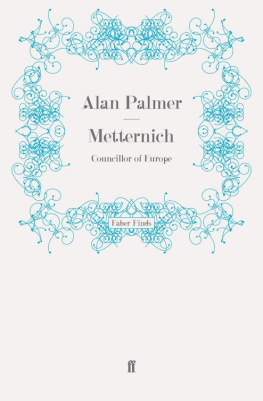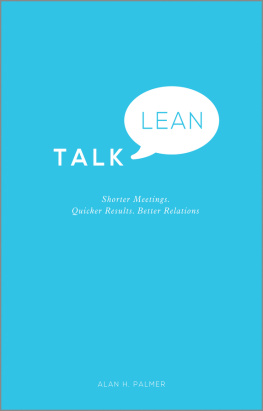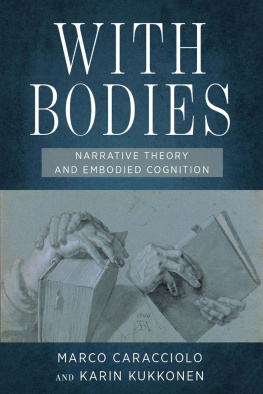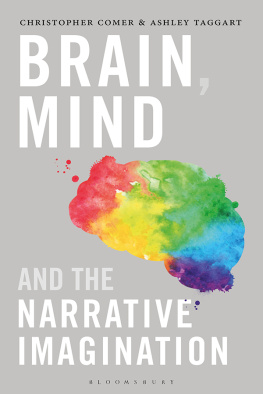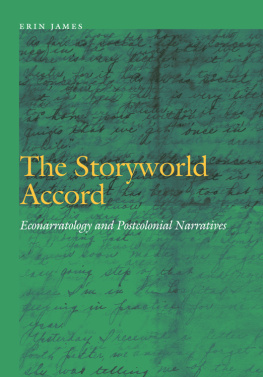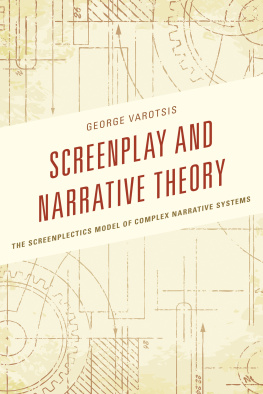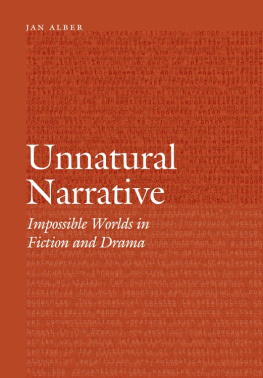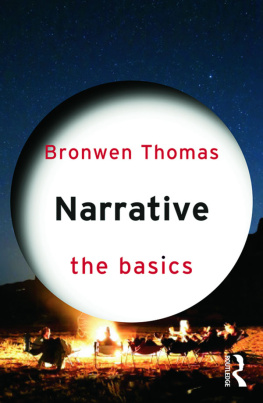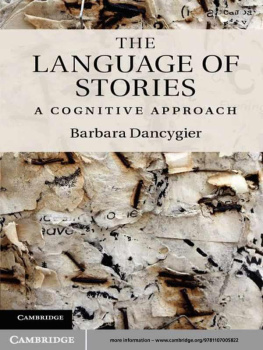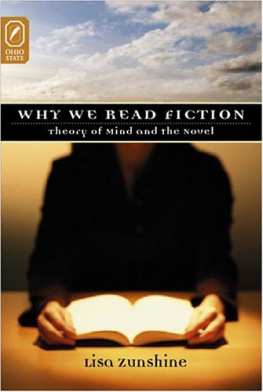In the Frontiers of Narrative series:
Story Logic: Problems and Possibilities of Narrative
by David Herman
Talk Fiction: Literature and the Talk Explosion
by Irene Kacandes
Narrative across Media: The Languages of Storytelling
edited by Marie-Laure Ryan
Fictional Minds
by Alan Palmer

Fictional Minds
frontiers of narrative
Series Editor
David Herman,
North Carolina State University
Fictional
Minds
Alan Palmer
University of
Nebraska Press
Lincoln and
London
Parts of this volume previously appeared in The Construction of Fictional Minds, Narrative
10 (1):2846.
2004 by the Board of Regents of the University of Nebraska
All rights reserved
Manufactured in the United States of America
oo
Library of Congress Cataloging-in- Publication Data
Palmer, Alan, 1950
Fictional minds / Alan Palmer.
p. cm.(Frontiers of narrative) Includes bibliographical references and index.
isbn 0-8032-3743-x (cl.: alk. paper)
1. FictionTechnique. 2. Charac- ters and characteristics in literature.
3. Intellect in literature. I. Title. II. Series. pn3383.c4p35 2004
809.3'927dc22
2003019700
Contents
Acknowledgments vii
1. Introduction 1
1. Background
2. Summary
3. Some Denitions and Assumptions
4. What the Book Is Not
5. A Note on the Texts
2. Some Narratological Approaches 28
1. Story Analysis
2. Possible Worlds
3. Characterization
4. Cognitive Science and Frames
5. Focalization
3. The Speech Categories 53
1. Summary
2. The Prosecution
3. The Defense
4. Thought Report
4. The Whole Mind 87
1. Functionalism
2. Language
3. Non-verbal Consciousness
4. Non-consciousness
5. Dispositions
6. Emotions
7. Action
vi Contents
8. First-Person Ascription
5. The Social Mind 130
1. Public Thought
2. Third-Person Ascription
3. The Development of Purposive Thought
4. Dialogic Thought
5. The Mind Beyond the Skin
6. The Fictional Mind 170
1. Summary
2. The Continuing-Consciousness Frame
3. Embedded Narratives
4. The Storyworld
7. The Fictional Mind in Action 205
1. Background
2. Thought and Action
3. Intermental Thought
4. Doubly Embedded Narratives
8. Further Applications 240
Bibliography 249
Index 263
Acknowledgments
I would like to thank the following: my mother; Brian and Sheila Barford; Kenneth Parker; Susannah Radstone; Linda Rozmovits; Molly Andrews and Corinne Squire of the Centre for Narrative Research at the University of East London; James Phelan; Lisa Zunshine; Couze Venn, for his thoughtful guid- ance and encouragement; Marie-Laure Ryan, for telling me about the theory- theory/simulation debate; Uri Margolin, for some stimulating and very helpful email discussions; Brian King for his rigorous and sensitive copyediting; and the editors of the University of Nebraska Press for their invaluable assistance.
There are three people to whom I owe a particularly large debt of gratitude. Robert Chase and David Herman have been extremely conscientious and amaz- ingly enthusiastic and supportive mentors. Both have been unfailingly generous with their time, advice, assistance, and support. The pure, disinterested scholar- ship of Bob and David has been an inspiration. Finally, I would like to dedicate this book to my partner, Sue: sine qua non.
Fictional Minds
1
Introduction
We never know them well, do we? Who?
Real people.
What do you mean, real people?
As opposed to people in books, Paola explained. Theyre the only ones we ever really know well, or know truly.... Maybe thats because theyre the only ones about whom we get reliable information.... Narrators never lie. Donna Leon, A Sea of Troubles
1. Background
Fictional Minds is about people in books. In particular, it is about the amount, range, variety, and reliability of the information on the ctional minds of people in books that we are able to obtain from those books.
A little personal history may be helpful here in order to explain the purpose of this book. I began studying ctional minds in 1995. I did this by looking at the Box Hill chapter in Jane Austens Emma and the Waterloo ball chapter in William Makepeace Thackerays Vanity Fair to see how the minds of the characters in those chapters were constructed. I chose those two texts because I thought that it would be interesting to examine the consciousnesses of characters interacting in groups. At that time, I am ashamed to say now, I was not even aware of the existence of narrative theory, or narratology, although as it happened this direct approach to primary texts turned out to be an absolutely inspired idea. Then once I had discovered that there was such a thing as narrative theory, I thought that it would be interesting to nd out what it said about my chosen area of study. After all what could be more central to the theoretical analysis of ction than the workings of characters minds? My rst encounter with narrative theory was with what I will call the speech category approach, and I was immediately struck by the fact that it did not provide a convincing explanation or even description of how the whole minds of characters in action were constructed. It seemed to
2 Introduction
me that there was a good deal that was going on in the Austen and Thackeray chapters that had not been captured by classication of the specic examples of direct access to ctional minds into the various speech categories. I felt as though I had stumbled into a large, fascinating eld that I very much wanted to explore further. A small corner of it had been tended and retended with, perhaps, obsessive care, while the rest of it appeared to me at that time to be neglected.
I read more widely within narrative theory and soon discovered the concept of focalization or what used to be called point of view. So another small corner of the eld had been cultivated. Focalization was informative, but it was still only a small part of the story. The third corner turned out to be story analysisthe structuralist study of the basic elements of plot structures. Next I came across characterization and, in particular, how the reader brings to the text preexisting cultural and literary stereotypes in order to construct satisfying patterns of behavior and convincing ctional personalities. Finally, and inexcusably late in the day, I encountered possible-worlds theory. This has proved very helpful indeed, although I soon found out that in certain ways it is not that well suited to the study of ctional minds. (You may have noticed that there are ve corners it is an irregularly shaped eld.)
So, the corners of the eld are well tended, but in the middle there remains a very large and apparently unexplored patch of land that still looks just as interesting to me today as it did at the beginning. But the oddest thing of all, as I continued my search within narrative theory for a comprehensive treatment of the whole of my area of interest, was that I found very little recognition of the fact that there was an area of interest at all. The various corners adjoin other
elds and appear to be viewed primarily as adjuncts to those other elds: the analysis of spoken speech in the case of the speech categories; various aspects of discourse analysis in the case of focalization; intertextuality in the case of characterization; classical structuralism in the case of story analysis; and modal logic in the case of possible-worlds theory. This seemed strange to me then, and it still does now. In fact, it is this continued sense of strangeness that drives this book. Even now, I still think, Why dont other people ask themselves what aspect of literary theory could be more important than ctional minds? This study is an attempt to mark out the boundaries of the eld as a well-dened subject area in its own right by linking together the previously well-trodden parts of it and by tending a few new patches of my own. I decided on the title
Next page



